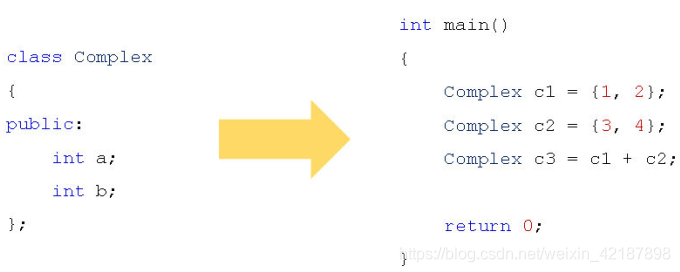版权声明:本文为博主原创文章,未经博主允许不得转载。 https://blog.csdn.net/weixin_42187898/article/details/83857119
如果在阅读过程中发现有错误,望评论指正,希望大家一起学习,一起进步。
学习C++编译环境:Linux
第三十课 操作符重载的概念
1.需要解决的问题
下面的复数解决方案是否可行?

30-1 复数的加法操作
#include <stdio.h>
class Complex
{
int a;//hide variable
int b;
public:
Complex(int a = 0, int b = 0)
{
this->a = a;
this->b = b;
}
int getA()
{
return a;
}
int getB()
{
return b;
}
friend Complex Add(const Complex& p1, const Complex& p2);
};
Complex Add(const Complex& p1, const Complex& p2)
{
Complex ret;
ret.a = p1.a + p2.a;
ret.b = p1.b + p2.b;
return ret;
}
int main()
{
Complex c1(1, 2);
Complex c2(3, 4);
Complex c3 = Add(c1, c2); // c1 + c2
printf("c3.a = %d, c3.b = %d\n", c3.getA(), c3.getB());
return 0;
}
2.思考
Add函数可以解决Complex对象相加的问题,但是Complex是现实世界中确实存在的复数,并且复数在数学中的地位和普通的实数相同。
为什么不让+操作符也支持复数相加呢?
3.操作符重载
C++中的重载能够扩展操作符的功能
操作符的重载以函数的方式进行
本质:
用特殊形式的函数扩展操作符的功能
通过operator关键字可以定义特殊的函数
operator的本质是通过函数重载操作符
语法:

Sign为系统中预定义的操作符,如:+,-,*,/,等
30-2 操作符重载初探–全局函数版本的实现
#include <stdio.h>
class Complex
{
int a;
int b;
public:
Complex(int a = 0, int b = 0)
{
this->a = a;
this->b = b;
}
int getA()
{
return a;
}
int getB()
{
return b;
}
friend Complex operator + (const Complex& p1, const Complex& p2);//友元函数
};//类定义之后又;
Complex operator + (const Complex& p1, const Complex& p2)
{
Complex ret;
ret.a = p1.a + p2.a;
ret.b = p1.b + p2.b;
return ret;
}
int main()
{
Complex c1(1, 2);
Complex c2(3, 4);
Complex c3 = c1 + c2; // operator + (c1, c2)
printf("c3.a = %d, c3.b = %d\n", c3.getA(), c3.getB());
return 0;
}
可以将操作符重载函数定义为类的成员函数
- 比全局操作符重载函数少一个参数(左操作数)this充当左操作数
- 不需要依赖友元就可以完成操作符重载
- 编译器优先在成员函数中寻找操作符重载函数

30-3 成员函数重载操作符–成员函数调用
#include <stdio.h>
class Complex
{
int a;
int b;
public:
Complex(int a = 0, int b = 0)
{
this->a = a;
this->b = b;
}
int getA()
{
return a;
}
int getB()
{
return b;
}
Complex operator + (const Complex& p)//成员函数版本---优先调用
{
Complex ret;
printf("Complex operator + (const Complex& p)\n");
ret.a = this->a + p.a;
ret.b = this->b + p.b;
return ret;
}
friend Complex operator + (const Complex& p1, const Complex& p2);
};
Complex operator + (const Complex& p1, const Complex& p2)//全局函数版本
{
Complex ret;
printf("Complex operator + (const Complex& p1, const Complex& p2)\n");
ret.a = p1.a + p2.a;
ret.b = p1.b + p2.b;
return ret;
}
int main()
{
Complex c1(1, 2);
Complex c2(3, 4);
Complex c3 = c1 + c2; // c1.operator + (c2)
printf("c3.a = %d, c3.b = %d\n", c3.getA(), c3.getB());
return 0;
}
小结
操作符重载是C++的强大特性之一
操作符重载的本质是通过函数扩展操作符的功能
operator关键字是实现操作符重载的关键
操作符重载遵循相同的函数重载规则
全局函数和成员函数都可以实现对操作符的重载